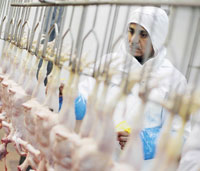Halal poultry: A minefield for producers

Halal is a market full of eastern promise, but it’s also a market full of potential pitfalls, as Scott Casey finds out
Halal chicken has been indentified as a strong growth market for UK and European poultrymeat producers.
In the UK alone, 4% of the population is Muslim, yet they account for 12% of total meat consumption, according to halal consultancy Imarat. Other estimates suggest 40% of poultry marketed in the UK already carries “halal” on the label.
But experts warn that disagreement over the definition of halal meat creates difficulties for domestic suppliers and exporters alike.
In Europe and the UK there is a number of different certification bodies, which set varying guidelines – and charge varying fees to use their logo and for inspection services.
This has prompted a degree of scepticism within the industry about their motives.
“In Europe there are many certification bodies and some have their heart in the right place,” said Koen de Praetere, general manager of Belgian processor Volys Star at the recent Informa Agra World Poultry 2010 conference in London. “But others have their wallet in the right place,” he added.
“We invested five years figuring out what exactly halal is. But by investing in halal knowledge we have been able to become independent of the halal certifying bodies. In my opinion, that’s the way we should be.”
Mr de Praetere said his company was eager to enter the market because he expected 70% of the growth in poultrymeat over the next two decades would be fuelled by Asia and the Middle East, where halal was in demand.
But he added that, due to the religious nature of halal, it could not be legislated for by government. He advised companies to conduct their own research into what was and what was not acceptable.
Certification issues
Issues over halal certification were highlighted earlier this year when fast-food retailer KFC riled certain sections of the Muslim community after it began serving halal products only in selected outlets in the UK.
The Halal Monitoring Committee (HMC), the Lancashire Council of Mosques (LCM) and a host of other Muslim community groups spoke out, saying chicken used in the KFC trial did not qualify as halal.
Specifically, the issue surrounded the use of mechanical slaughter, which the Halal Food Authority – Britain’s oldest regulatory body and the organisation KFC used – said was acceptable. The Halal Monitoring Committee and the Lancashire Council of Mosques disagreed vehemently, saying killing should be done by hand.
In 2009 the HMC conducted a poll of Muslim religious leaders and found 94% disagreed with the practice of machine killing.
Mohammed Saleh, chief executive of the Middle East’s largest poultry producer, Al-Watania Poultry, said these issues were an impediment to Europe developing true halal processing. “I think if they want to write halal (on the label) they need to kill halal, and Europe will need to change its laws,” Mr Saleh said.
In the UK there is also controversy about the use of pre-stunning, which is carried out by all domestic halal manufacturers.
Call for clearer rules
Poultry processors have called for clearer rules on what is and what is not acceptable practice for poultrymeat to qualify for a halal label.
Naved Syed, managing director of halal meat producer Janan Meat Limited, said there was a need in the UK for national regulation to settle the issues around stunning and slaughter.
“We need a government system,” he told Poultry World. “The biggest problem is in the poultry sector, as both these organisations – the Halal Food Authority and the Halal Monitoring Committee – have produced no written documentation. They have produced a guideline, but it is ambiguous,” Mr Sayed said.
The Food Standards Agency has published guidelines for halal produce and the slaughter of animals according to Muslim practices, but they do not enforce them.
“We provide local authorities with guidance on halal food, but the local authority needs to carry out any enforcement to see whether food is what it claims to be,” said an FSA spokesperson.
But Muhammad Shaakir from the the Halal Monitoring Committee said he would like to see the involvement of the Muslim community when organisations set halal requirements.
“This standard should be comprised from the views of the Muslim scholars and consumers in the UK,” he said. “We do not see producers labelling something that is remotely vegetarian with the vegetarian mark based on a minority opinion.
“Similarly, producers of halal should label as halal only those products that the Muslim consumer and scholars in the majority consider as halal.”
